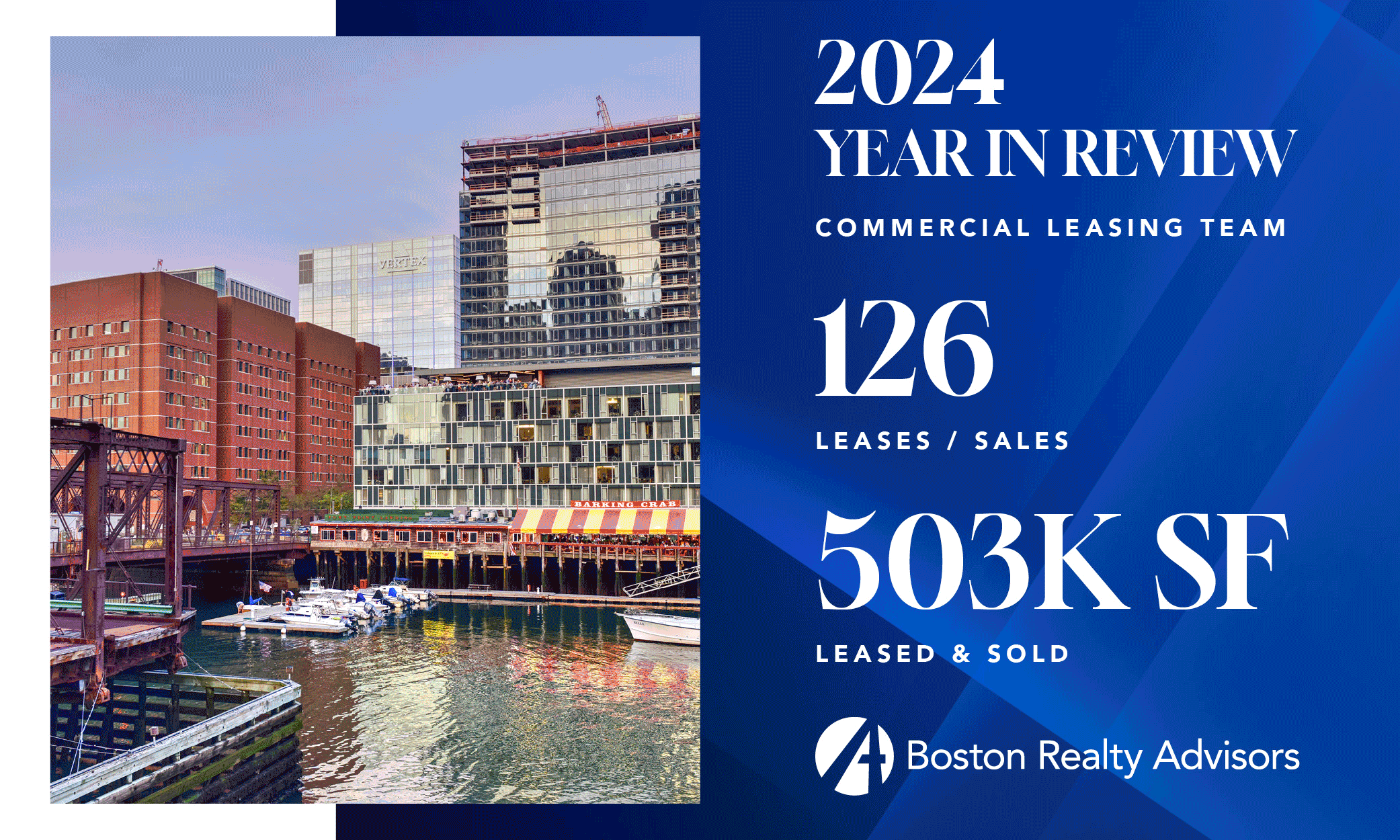Boston & Cambridge Office Markets – 2024 Year-End Review
The Boston and Cambridge office markets demonstrated remarkable resilience in 2024, supported by the region’s core strengths: innovation, a diversified economy, and world-class educational institutions. These factors have reinforced businesses’ commitment to maintaining a physical office presence, contributing to overall market stability. Key indicators—including stable asking rents, minimal increases in availability, and robust leasing activity—suggest the market is laying the groundwork for recovery.
Market Overview
At year-end, overall office availability in Boston and Cambridge reached 15.31%, a modest 50 basis point (bps) increase from 2023. Asking rents averaged $63.98 per square foot, reflecting a slight 1% decrease year over year.
A closer look at availability by submarket and building class reveals how much the landscape has shifted since 2019. In Boston’s Financial District, Class A availability jumped from 8.46% to 20.43%. In the Back Bay, Class B availability increased from 10.9% to 23.95%. The elevated supply of office space remains the key challenge in the market’s recovery, but encouraging signs are emerging.
Key Trends in 2024
- Renewals Dominated the Market
Renewals accounted for over 60% of all leases signed, particularly in the Class A segment. Meanwhile, the Class B market saw a continued “flight to quality,” as tenants sought upgraded spaces with better amenities and more favorable lease terms, often opting to relocate rather than renew.
- Net Absorption Remained Negative, But the Story is More Nuanced
Net absorption totaled negative 2.1 million square feet in 2024. However, a deeper look reveals promising trends:
- Sublease inventory declined by 1.5 million square feet, marking the first positive sublease absorption since the pandemic.
- New construction, such as 650 Atlantic Avenue, added over 1 million square feet to inventory, influencing absorption figures.
- Adjusted for new supply, 2024 saw the smallest negative absorption since the pandemic—an indication that the market is beginning to stabilize.
- Office-to-Other-Use Conversions Accelerated
Adaptive reuse gained momentum in 2024, with 14 Class B/C office properties (totaling 681,000 square feet) approved for conversion, primarily into residential. These projects are set to deliver 528 new residential units across the Financial District, Seaport, North Station, and South End. Additionally, one property is slated for hotel conversion, and another for a Suffolk University dormitory. The City of Boston’s tax credit pilot program extension (through December 31, 2025) is expected to drive further conversions.
- Leasing Activity Matched Pre-Pandemic Levels
Boston Realty Advisors’ commercial leasing team completed 120 office lease transactions across Boston and Cambridge in 2024—demonstrating a return to pre-pandemic leasing velocity and reinforcing positive sentiment in the market.
Boston vs. Cambridge: Diverging Paths
While Boston and Cambridge both ended 2019 at historic highs, their post-pandemic trajectories have diverged:
- Boston’s availability in 2019 was just under 9%, compared to below 3% in Cambridge.
- Between 2020 and 2022, Cambridge’s availability rose gradually, with rents holding steady, while Boston experienced a sharper correction.
- Since 2022, Cambridge’s availability surged to nearly 7%, even as Boston’s market showed signs of stabilization.
The key differentiator? Rental trends. Cambridge Class A and B asking rents declined 10-15% over the past two years, while Boston’s rents have remained stable. Looking ahead, Cambridge faces continued downward pressure on office rents, particularly in Class A properties. Additionally, the historic oversupply of lab space and muted office leasing demand pose unique challenges.
In contrast, Boston’s fundamentals appear stronger in the near term, with increasing tenant engagement and more leasing velocity across multiple submarkets.
Market Outlook: 2025 and Beyond
During the Great Recession in 2011, I attended a year-end real estate event where a senior leasing executive was asked: “When will the downturn end?” He confidently predicted a date 12 months ahead. The room erupted in laughter—how could anyone pinpoint an exact recovery date? But his point was clear: Recovery is inevitable.
As we reflect on 2024, it feels as though we have turned a corner. Many of the challenges we anticipated have been addressed. While obstacles remain—such as a higher interest rate environment and ongoing corporate workplace adjustments—there are signs of progress:
- Office attendance is now at 70% of pre-pandemic levels
- Transactions are happening—buildings are trading, and leases are getting signed
- Companies are refining their workplace strategies, solidifying long-term plans
Boston and Cambridge have repeatedly demonstrated their resilience. Looking ahead, 2025 will mark a period of recovery and perhaps a reinvention of what makes our region so dynamic.
ROBERT F. LECLAIR
Managing Director & Partner | Boston Realty Advisors
617.850.9614 | rleclair@bradvisors.com
Source: Boston Realty Advisors’ proprietary research database
Included Submarkets:
- Boston: Financial District, Back Bay, Seaport, North Station, Charlestown, South End, and surrounding areas
- Cambridge: East Cambridge, Mid-Cambridge, West Cambridge




